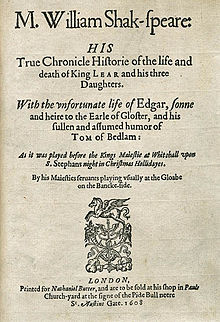Portal:English literature
Appearance
English literature is the literature written in the English language, including literature composed in English by writers not necessarily from England. English literature is as diverse as the varieties and dialects of English spoken around the world. Despite the variety of authors of English literature, the works of William Shakespeare remain paramount throughout the English-speaking world.

| Language | Era |
|---|---|
| Anglo-Saxon (Old) | 450–1100 |
| Middle | 1100–1475 |
| Early modern | 1475–1650 |
| Modern | 1650— |
Literary History
[edit]A Short Biographical Dictionary of English Literature by John William Cousin (1910)
1911 Encyclopedia Britannica classified articles and their Wikisource author pages:
Descriptions by Types and Eras
[edit]- "Chapter 4: English Poetry" and "Chapter 5: English Prose", 1906 in The First Half of the Seventeenth Century by Herbert J. C. Grierson. In Saintsbury, George Edward Bateman. Periods of European Literature. vol. 7, pp. 135-201, 202-243.
Collections of Works
[edit]Individual Works by Period
[edit]Old English
[edit]- See also: Anglo-Saxon Wikipedia
- Portal:Old English literature
- Cædmon's Hymn, composed between 658 and 680, recorded in the earlier part of the 8th century, by Cædmon
- The Dream of the Rood, 7th-10th century, unknown author (although is has been attributed to Cædmon or Cynewulf)
- Poem of Judith, 7th-10th century, unknown author (although is has been attributed to Cædmon or Cynewulf)
- Beowulf, between the 8th and 11th century, unknown author
- Crist, 8th-9th century by Cynewulf
- Anglo-Saxon Chronicle, 9th century, compiled under the direction of Alfred the Great (multiple versions)
- Ingram translation, 1823, by James Ingram in modern English
- Widsith, 9th century, unknown author
- Ælfric's Colloquy, 9th-10th century by Ælfric
- St. Edmund, King and Martyr, 9th-10th century by Ælfric, translated by Wikisource
- The Rhyming Poem, unknown author, recorded in the 10th century Exeter Book (Codex Exoniensis)
- The Wife's Lament, unknown author, recorded in the 10th century Exeter Book (Codex Exoniensis)
Translations into Old English
[edit]- Portal:Biblioþēce, Bible texts in Old English
- Fæder ūre, The Lord's Prayer in Old English
Middle English
[edit]- Alysoun, poem circa 1300, unknown author
- Anelida and Arcite, late 1370s poem by Geoffrey Chaucer
- Balade to Rosemounde, 14th century poem by Geoffrey Chaucer, translated by Wikisource
- Bible, 1380s, translation organised by John Wycliffe
- Blow northerne wynd!, 14th century poem, unknown author
- The Book of the Duchess, 1368-1371 poem by Geoffrey Chaucer
- The Canterbury Tales, late 14th century by Geoffrey Chaucer, first published in 1478 by William Caxton
- Confessio Amantis, 14th century poem by John Gower
- Fredome, 14th century poem by John Barbour, extracted from The Brus
- The House of Fame, probably 1379-1380 poem, by Geoffrey Chaucer
- A Hymn to the Virgin
- Ich am of Irlaunde, circa 1300, unknown author
- John Ball's letter to an unidentified community, 1381 sermon by John Ball translated by Wikisource
- The Legend of Good Women, 1380s poem by Geoffrey Chaucer
- Lenten ys come with love to toune, circa 1300, unknown author
- Lines from Love Letters, unknown author
- Macbeth and the Weird Sisters, 1420 by Author:Andrew of Wyntoun
- Matthew Cooke Manuscript, 1450s masonic text
- The Parliament of Fowles, 1381-1382 poem by Geoffrey Chaucer
- Pearl
- Piers Plowman by William Langland
- The Vision and Creed of Piers Ploughman edited by Thomas Wright
- Piers Plowman (excerpt)
- Sir Gawain and the Green Knight
- Sumer is icumen in
- The Choise of Valentines
- This Worldes Joie
- Troilus and Criseyde
Early modern English
[edit]Modern English
[edit]- Portal:Modern British literature
- Portal:The Bickerstaff-Partridge Papers
- Portal:Speeches by British Prime Ministers
- Guy Mannering, by Walter Scott (1815)
See also
[edit]Child portals
[edit]- Portal:American literature
- Portal:Australian literature
- Portal:British literature
- Portal:Canadian poetry
- Portal:Irish drama
